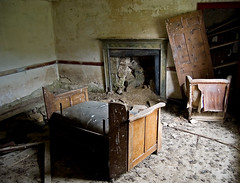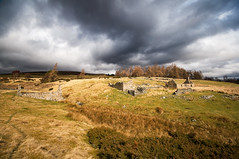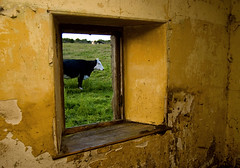I have written about my admiration for the work of Diane Arbus before in this blog - Aberdeen Art Gallery; Barcelona; the impact she had on me to get back into photography.
Strangely enough, I have never asked myself why I like her work. What is it about her images that I find so intriguing and interesting? After all, the photographs I take are nothing like her work.
I am finding it hard to put into words why I like her images.
I too take images of communities who lived on the edge - on the margins of civilisation, remote, far from amenities and facilities. Outsiders perhaps?
Yes, my images also contain ugliness and a lack of beauty but then we all know what they say about beauty.
I can't say I challenge the viewer as perhaps Arbus's work does, however I am trying to alter the experience of the viewer to decay, debris and to stuff that was once loved and admired but left behind. Some see Arbus's images as portraying people full of despair but I find them intriguing and remarkable. Her "deviant and marginal' people seem to be doing the best they could under some difficult circumstance, within a society that rejected their lifestyle and for some, rejected their shape, size and sexual orientation. Her images are, to me, full of energy and life, as well as compelling. Her work is raw, at times disturbing, unflinching but what an insight we get to a world we would never have seen otherwise.
There is no doubt you can feel like an intruder, a voyeur when looking at her work. Her subjects and the lives they led are almost 'run of the mill' these days, with TV programmes filling late night spots with 'embarrassing bodies' and the like. Looking at my images of someone else's home, albeit abandoned and in a state of decay, may feel like intruding and you may want to look away or you may get a feeling of foreboding - "what will happen to my home, to my 'stuff', when I'm gone?"
Many of Diane Arbus's images hold my attention but also make me want to look away and perhaps it is that conflict that, for me, makes her work so captivating.
So what can I learn from her work? Eric Kim asked the same question regarding his street photography. I have changed his blog post to consider rural exploration/abandoned communities instead of street photography:-
1. Go places you have never been
Arbus shares some of her thoughts:
“My favourite thing is to go where I’ve never been. For me there’s something about just going into someone else’s house. When it comes time to go, if I have to take a bus to somewhere or if I have to grade a cab uptown, it’s like I’ve got a blind date. It’s always seemed something like that to me. And sometimes I have a sinking feeling of, Oh God it’s time and I really don’t want to go. And then, once I’m on my way, something terrific takes over about the sort of queasiness of it and how there’s absolutely no method for control."
I constantly read local history books and scour maps to find new places, never knowing what I'll find. The planning and the journey to find the abandoned place plays a huge part in my work.
2. The camera is a license to enter the lives of others
As Arbus explains:
“If I were just curious, it would be very hard to say to someone, “I want to come to your house and have you talk to me and tell me the story of your life.” I mean people are going to say, “You’re crazy.” Plus they’re going to keep mighty guarded. But the camera is a kind of license. A lot of people, they want to be paid that much attention and that’s a reasonable kind of attention to be paid."
Documenting abandoned and disappearing communities deserves attention and my camera, my project, has got me into properties to capture the fading memories of lives long since past.
3. Realise you can never truly understand the world from your subjects eyes
"You might have a certain intent when photographing, but the result can be totally different. Not only that, but what we may perceive as a “tragedy” may not be considered as a tragedy to your subject:
And that has to do with what I’ve always called the gap between intention and effect. I mean if you scrutinize reality closely enough, if in some way you really, really get to it, it becomes fantastic. You know it really is totally fantastic that we look like this and you sometimes see that very clearly in a photograph. Something is ironic in the world and it has to do with the fact that what you intend never comes out like you intended it.
What I’m trying to describe is that it’s impossible to get out of your skin into somebody else’s. And that’s what all this is a little bit about. That somebody else’s tragedy is not the same as your own“.
I feel many emotions in empty cottages, but they are really what I imagine it must have been like either to live there or how it felt to have to leave. They are only my emotions.
4. Create specific photographs
“A photograph has to be specific. I remember a long time ago when I first began to photograph I thought, There are an awful lot of people in the world and it’s going to be terribly hard to photograph all of them, so if I photograph some kind of generalized human being, everybody’ll recognize it. It’ll be like what they used to call the common man or something.
It was my teacher Lisette Model, who finally made it clear to me that the more specific you are, the more general it’ll be. You really have to face that thing. And there are certain evasions, certain nicenesses that I think you have to get out of."
More and more I am taking shots that, may not have the compositional appeal or be pleasing to the eye, but mean something to me. I may have been moved by something left behind or some part of the cottage may have brought back a personal memory - either way, the image I take on those occasions resonate with people much more than the bog standard abandoned cottage shot.
5. Adore your subjects
“Freaks was a thing I photographed a lot. It was one of the first things I photographed and it had a terrific kind of excitement for me. I just used to adore them. I still adore some of them, I don’t quite mean they’re my best friends but they made me feel a mixture of shame and awe."
I think it is clear that I love local history!
6. Gain inspiration from reading
“Another thing I’ve worked from is reading it happens very obliquely. I don’t mean I read something and rush out and make a picture of it. And I hate that business of illustrating poems.
But here’s an example of something I’ve never photographed that’s like a photograph to me. There’s a Kafka story called “Investigations of a Dog” which I read a long, long time ago and I’ve read it since a number of times. It’s a terrific story written by the dog and the real dog life of a dog."
I think it is clear that to be a better photographer, it is important to embrace life, to get inspiration for many aspects of life be it reading, music, travel, walking, etc.
7. Take bad photos
“Some pictures are tentative forays without your even knowing it. They become methods. It’s important to take bad pictures. It’s the bad ones that have to do with what you’ve never done before. They can make you recognize something you had seen in a way that will make you recognize it when you see it again."
I am realising this more and more. The more I fail, the more I learn. But I can't fail if I don't get out and shoot. Of course it is crucial to understand what went wrong and how might that be fixed. Accidents are a different thing altogether.
8. Sometimes your best photos aren’t immediately apparent (to you)
“Recently I did a picture—I’ve had this experience before—and I made rough prints of a number of them, there was something wrong in all of them. I felt I’d sort of missed it and I figured I'd go back. But there was one that was just totally peculiar. It was a terrible dodo of a picture. It looks to me a little as if the lady’s husband took it. Its terribly head-on and sort of ugly and there’s something terrific about it. I’ve gotten to like it better and better and now I’m secretly sort of nutty about it.”
Oh, how I would love to have a picture editor! So important to go back over old work with a new mind.
9. Don’t arrange others, arrange yourself
“I work from awkwardness. By that I mean I don’t like to arrange things if I stand in front of something, instead of arranging it, I arrange myself”.
10. Get over the fear of photographing by getting to know your subjects
To overcome her fear of shooting junkies people in a park (who frightened her) – Diane would revisit over and over again, and found out over time she became less timid. Not only that but she got to know the people there, and asked for permission. This helped her feel more comfortable and photograph the people in the area.
I have overcome my feeling of intruding, my fear of been 'found out' and continue to work on my confident manner when approaching locals or when confronted by concerned individuals who want to know what I'm doing. Often the conversation ends in my favour when they tell me about other abandoned cottages.
11. Your subjects are more important than the pictures
Although Arbus was criticised much during her lifetime (and even now today) for seemingly lacking compassion – she certainly did care for her subjects more than the photos themselves:
“For me the subject of the picture is always more important than the picture. And more complicated. I do have a feeling for the print but I don’t have a holy feeling for it. I really think what it is, is what its about. I mean it has to be of something. And what its of is always more remarkable than what it is.”
I have to give this one more thought because I think I amy be going in the opposite direction. Initially, it was all about the history of these abandoned glens and documenting them before they fell into even more ruin. Other photographers suggested I focus my work more on the details of the cottages, more on producing images that evoke emotions and memories. I'm trying to do this and enjoying the challenge but, to be fair to myself, I sense it will make me want to delve even deeper into the my interest, my passion, to hopefully produce better images.
Diane Arbus was not only a ground breaking and controversial photographer, but she also had deep feelings and emotions with and for her subjects. This clearly comes across in her photography. She followed her heart in her photography and took photos of subjects that not only interested her but felt compassion and warmth towards.
( All Arbus quotes from Diane Arbus: An Aperture Monograph.)



